Movie Scene
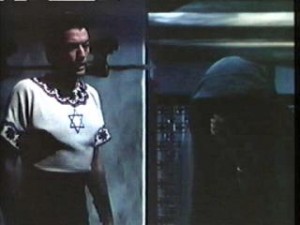 1. David’s meeting with Bathsheba immediatelysucceeds a scene wherein the movie’s character, David, and his wife, Michal, have an argument. Michal hotly accuses her husband of ignoring her – a charge he does not deny. King David adds insult to her injury by insinuating that he has only remained 1. David’s meeting with Bathsheba immediatelysucceeds a scene wherein the movie’s character, David, and his wife, Michal, have an argument. Michal hotly accuses her husband of ignoring her – a charge he does not deny. King David adds insult to her injury by insinuating that he has only remained 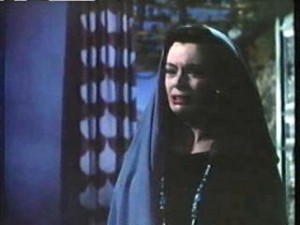 married to her for political gain. He tells her that their marriage is past its “days of passion” but that he hopes they can maintain a civil relationship. This scene leaves Michal visibly hurt, and David in turmoil. married to her for political gain. He tells her that their marriage is past its “days of passion” but that he hopes they can maintain a civil relationship. This scene leaves Michal visibly hurt, and David in turmoil.
2. Clearly the playwrights used the argument scene to set the stage for our hurt hero to become more vulnerable to the temptation of adultery.
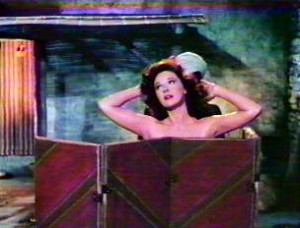 3. After the argument, the character David exitshis palace to the rooftop where he spies Bathsheba bathing on another roof. 3. After the argument, the character David exitshis palace to the rooftop where he spies Bathsheba bathing on another roof.
4. The character David is obviously moved by the sight of beautiful 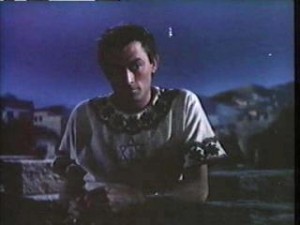 Bathsheba. At first his raised eyebrows and longing stare seemed amusing to this student – until it was realized that this lustful stare represented the birthing of sin. Oh, to think of the many lives that would have benefited if he refused to allow his eyes to linger! Bathsheba. At first his raised eyebrows and longing stare seemed amusing to this student – until it was realized that this lustful stare represented the birthing of sin. Oh, to think of the many lives that would have benefited if he refused to allow his eyes to linger!
5. David calls for his servant “Abishai” to inquire of Bathsheba. The character 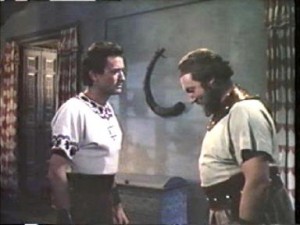 Abishai agrees to call for Bathsheba in the morning. When David insists that she be called immediately, Abishai seems to flash a knowing grin at David as he bows low. Abishai agrees to call for Bathsheba in the morning. When David insists that she be called immediately, Abishai seems to flash a knowing grin at David as he bows low.
6. In the next scene the actor, Gregory Peck, and the actress, Susan Hayward, meet as David and Bathsheba.
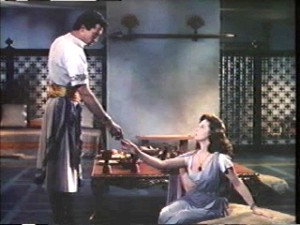
Their dialogue is intellectually stirring, and powerfully romantic. It seems to reflect the standards of movie romance from the early 1950s.
7. During introductions, Bathsheba reveals thatshe and her husband, Uriah, have been married seven months, and within that time frame, have only been with one another a total of six days. In no uncertain terms, Bathsheba indicates to 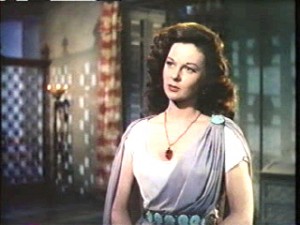 David that she is unhappy with her marriage. David that she is unhappy with her marriage.
It is clear that the writers of the movie are trying to portray two people who are unhappy in their marriages. The Biblical account does not support such a convenient conclusion.
8. Gregory Peck and Susan Hayward share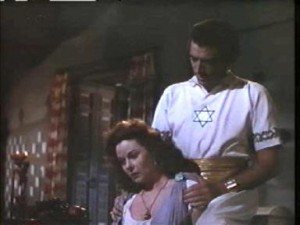 aheated kiss (so passionate was the kiss that Bathsheba must take a moment to compose herself afterward!). aheated kiss (so passionate was the kiss that Bathsheba must take a moment to compose herself afterward!).
9. Bathsheba reveals that not only does she have eyes for the King, but that she had planned the rooftop bath to coincide with his evening walks.
10. As the scene unfolds, the character Bathsheba reveals herself as a willing participant in the adulterous affair.
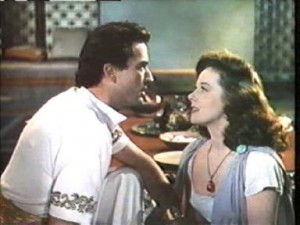
She also makes it clear that she is not interestedin a one night stand, and that she wants to plan a life with David. She asks David to think of her as his wife. David responds by reminding her that she is “not free” (married). Bathsheba looks away, sits down, and seductively asks David what if she “were free.” Are the playwrights suggesting that Bathsheba first hints of her husband’s murder?
|
Biblical Account
1. Did Michal argue with David as portrayed in the movie? We have no Biblical account describing this dispute. We do know, however, that Michal was not afraid of confronting David (2 Sam. 6:20), nor was she a coward – as she hid David from her very violent father (1 Sam. 19:11-17). Therefore, though the argument scene lacks a supporting Biblical narrative, it does not seem unreasonable in light of the characters involved.
The Biblical account does support the idea that David and Michal eventually become estranged (II Sam. 6:16-23). However, the scriptural timeline seems to suggest that it occurred afterthe “Bathsheba” incident – not before as suggested by this scene.
2. The Bible does not detail all of the circumstances that may have influenced David during the impending temptation. Perhaps this is because Scripture consistently teaches that responsibility toward sin cannot be distributed to any but ourselves.
3. II Sam. 11:2 concurs that it was night when David saw Bathsheba bathing. However, the Biblical account describes David as having left his bed to go to the rooftop – not storming out of the palace after an argument.
Why was Bathsheba bathing on a rooftop at night? Though that might seem strange by our standards, the writer of II Samuel offers no excuse for this act – possibly suggesting to us that the early readers would not have questioned this behavior.
4. If he caught just a glimpse of Bathsheba, or if David leered for a great while – we do not know. The Biblical account tells us only that he found the woman very beautiful. The body language of the actor does not stretch the passage too far for us.
5. The author of 2 Samuel does not provide us with the identity of David’s messenger(s), or his/her/their reactions to David’s request.
Interestingly, the KJV, NIV, NAS, NAU, & NKJV all intimate that messengers (plural) were sent for Bathsheba. The Hebrew word used here for messenger (mal’ak) is sometimes translated in the singular (2 Sam. 11:22). Could it be that Hollywood more correctly translated the passage than our English Bibles – giving us just a single servant?
6. The few verses of scripture give us no record of David and Bathsheba’s dialogue – or lack of one. If words were exchanged, then they must have been less important to the author of this scriptural passage than was the deed committed that night.
7. The Biblical record gives us no account of the length of Bathsheba’s marriage to the non-Jewish Uriah, or how much time they spent together. Furthermore, there is no Biblical narrative allowing the reader to empirically reach the conclusion that Bathsheba is unhappy in her marriage. On the contrary, when Nathan later uses a parable (II Sam. 12:1-4) to condemn David’s adultery, it is strongly suggested that the man of the parable (Uriah) loved his little lamb (Bathsheba) very much.
8. The Biblical writers give us no insight into Bathsheba’s reactions to David. Was she swept away by a suave demeanor? Did she willingly plunge headlong into the adulterous affair? Did she feel trapped because of his powerful position? Or, is it even possible that Davidraped Bathsheba?
The Bible does not answer these questions. It only says that David “lay” (KJV) with Bathsheba.
Although the Hebrew word, shakab (translated here as “lay”), is used in connection with rape (Duet. 22:25 & II Sam. 13:14), in both occasions it was first modified by the Hebrew word “chazaq” – translated “force.” Therefore, though the language does not necessarily rule out rape, it does not seem likely, since the author of II Samuel knows how to modify the word to designate rape.
9. From the corresponding scripture, we cannot conclusively determine whether or not Bathsheba intended to entice David. Although it is possiblethat the movie captured the truth – or something close to it – it would only be speculative to assume so.
10. Because of the lack of information that we have of Bathsheba’s intentions, this passage of scripture, and the adultery, keeps our focus fixed upon David. The Bible is almost awkwardly silent on the fact that if Bathsheba were not raped, then she too would have been guilty of adultery. Yet, we find no record of judgment (or even forgiveness) extended to her.
Was Bathsheba vixen or victim? The few verses of scripture that we have describing her, are as scant of detail as she apparently was of bathing attire, and we are left only to wonder.
|